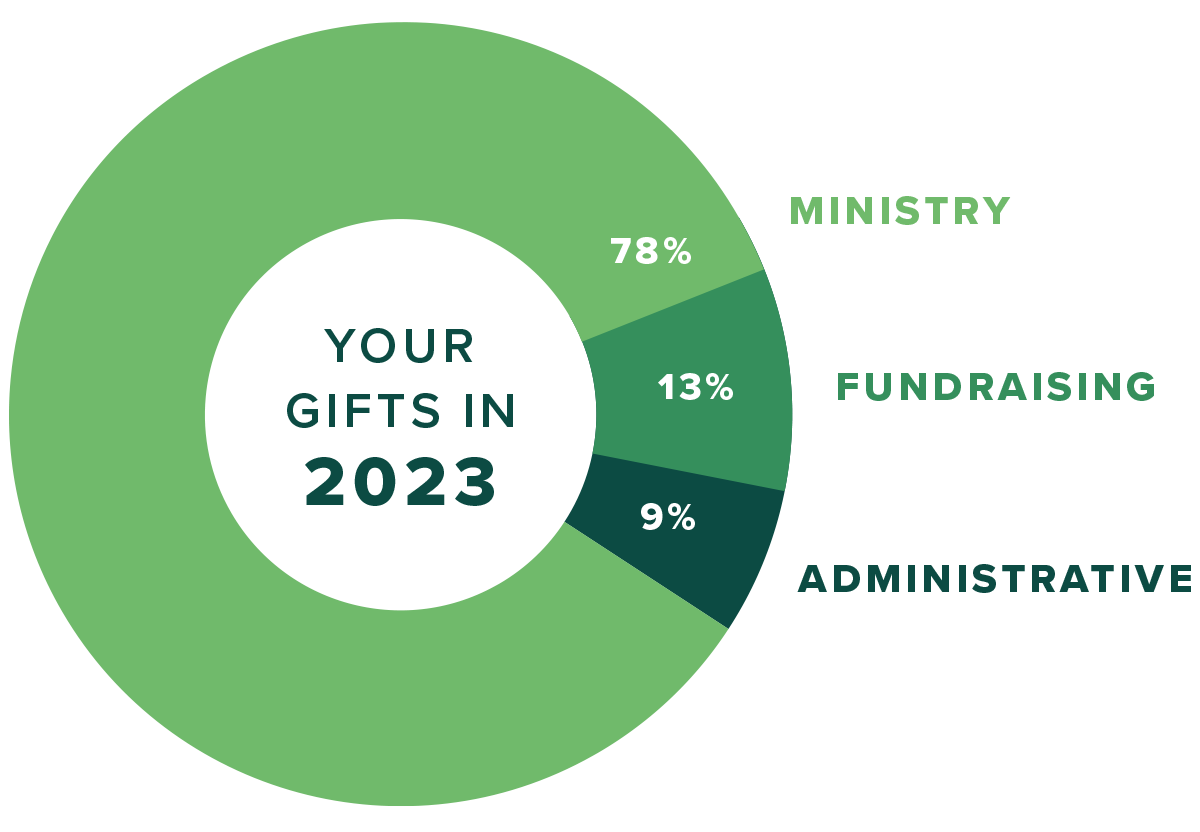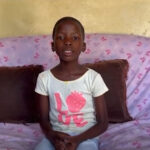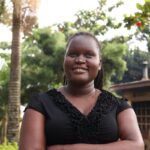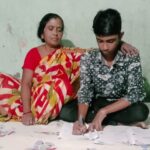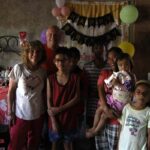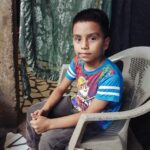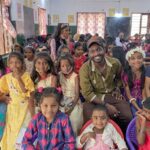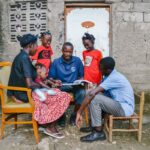A Child Champion’s Persistence
A Child Champion and a medical camp at a Hope Center in Malindi help a little boy get the correct diagnosis and medicine just in the nick of time.
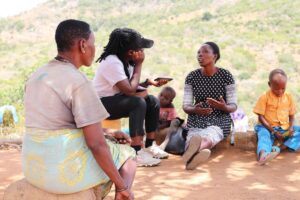
Donna Atola talks with Child Champion Josephine as she relays Alex’s (in yellow shirt) story.
“I want to become a driver of an airplane when I grow up,” little Alex says as he giggles. He points to the sky to show where he sees planes, before his Child Champion, Josephine, politely tells him that planes are flown and not driven.
“But teacher, don’t the planes have a driver like vans do?” Alex asks as he smiles.
Josephine and Alex strike up this conversation as Josephine is ushered by Alex’s grandmother, Bahati, to sit on a stump under a tree. The rest of us from the Hope Center are also offered seats on logs and the yellow jerry cans used to fetch water as we settle in to visit with Alex’s family in Malindi, Kenya.
A Visit With Alex
The family lives in poverty a mile from Mwangea Hope Center, up a steep rocky hill. The meandering path we took to reach their home is dusty and full of rocks.
When we arrived a few minutes earlier, we saw Alex peep through his grandmother’s door. When he spotted Josephine, he smiled, waved, and covered his face with his hands.
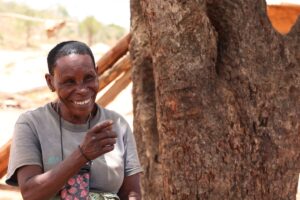
Bahati, Alex’s grandmother, says she began to notice that Alex wasn’t well.
Six-year-old Alex is a bubbly little soul. But save for his smile and his ability to keep up a conversation, this was not the case back in 2019 when he was enrolled at the Hope Center.
An Alert Child Champion
Settled in the shade of the tree, we listen to Alex’s harrowing story. Josephine recalls that when she joined the Hope Center, Alex was one of the first children who stood out from the others.
“I noticed he was different, but at the time, I couldn’t figure out what was wrong. All I knew was that he didn’t seem OK,” she says.
“Alex would always be asleep in class and even when other kids ran out to skip ropes and play hide-and-seek, Alex would just stay in and sleep. He seemed tired most of the time, and his skin looked pale and his hair dull.”
Josephine contacted Alex’s mom to ask what the matter was with the boy. But his mom said Alex was OK.
Deep down, Josephine still knew something wasn’t right.
A Mystery Illness
Alex’s grandmother, Bahati, takes up the story. She says Alex was a perfectly healthy boy from birth, but things changed when he turned 3.
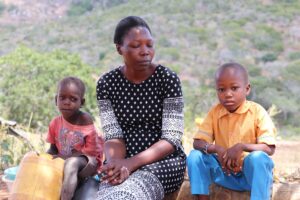
Josephine tells the story about what happened with Alex earlier.
“It all started when his stomach became big, then his eyes became yellow, his skin developed wrinkles, and his hair became brittle,” Bahati says.
Shortly after, he began losing weight.
With the weight loss and a swollen stomach, the family quickly assumed he had a problem that is commonly diagnosed in the village — an issue with his cecum, a pouch that connects the small intestines and the colon.
“In this village, whenever a child is sick and has a big stomach, it is mostly assumed that the stomach is caused by eating soil because most of them eat it,” Bahati explains. “When the soil accumulates in the cecum, there are traditional medicines that are given to help get the soil out of their system. The medicines have been tried before on most kids around, and they have helped kids feel better.”
So, Alex’s family got some concoctions from a traditional healer and gave them to Alex. But after two months of taking the concoctions, Alex’s health continued to deteriorate.
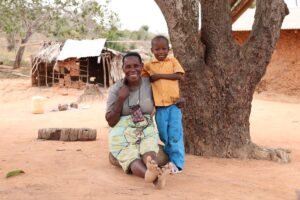
Alex and his grandmother, Bahati.
They then tried seeking help from a local dispensary a mile from their home. However, the remote village has no good health care system, and the local dispensary is understaffed and underequipped.
Bahati says the medics at the dispensary gave them painkillers, but no tests were done to learn what he was suffering from.
“We couldn’t afford to take him to a well-equipped hospital in Malindi,” Bahati recalls. “But whenever he was in pain, it was easy to carry him to the dispensary and only pay 2 cents for the services and painkillers.”
New Hope, Old Hardships
Alex might have gone undiagnosed indefinitely. But in 2019 the Mwangea Hope Center opened, and he was registered in the sponsorship program.
In August of the same year, the Hope Center held its first medical checkup for the kids. Medics from government facilities were contracted by the center to help conduct the checkups.
After the checkups, Alex and some other kids were referred to Malindi Sub-County hospital for further diagnosis. Their parents were asked to supply only the bus fare to the hospital while the Hope Center covered all the hospital bills.
Parents were also expected to accompany their kids to the hospital, which is 28 miles from the Hope Center.
But Alex couldn’t join the first trip to the hospital because his mother could not leave her work for fear of losing her job. Josephine explains that Alex’s mom had been raising the family alone since 2017 when Alex’s father died after a short illness. She worked as a cook in a nearby school to provide for her six children and their grandmother.
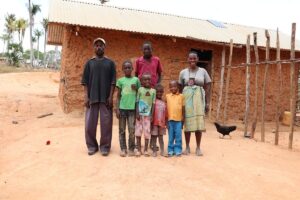
Alex with his family.
Failing to go to work would likely have gotten her fired or, at best, her pay for the day would have been deducted from her monthly salary of only $40.
So Alex’s mom asked the center to let them make the trip the following month, which meant that the center had to organize a trip during the school holidays.
Josephine says that when the holidays came, Alex’s mom again seemed reluctant to make the trip.
Josephine then visited their home, and after a heart-to-heart conversation with Alex’s mom, Josephine realized the problem was that she couldn’t afford the bus fare. So Josephine offered to pay for their transportation.
“I couldn’t sleep peacefully knowing the boy’s health was deteriorating,” she says. “I knew other kids who were sick, but I found peace knowing they had been to the hospital and were on medication. Except for Alex.”
They finally made it to the hospital and after laboratory tests were done, it was recommended that Alex be admitted to the hospital.
But Alex’s mom had to go home and return to work to provide for her family. Despite Josephine’s concerns, they were given some medicine and went home.
Suddenly Orphaned
We all feel Josephine’s disappointment as she relates the story, and we wait anxiously for her to continue.
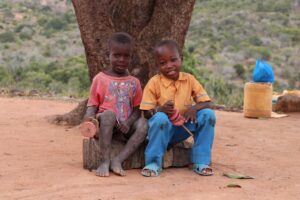
Alex with one of his siblings.
Fast forward to December 2021. During the Hope Center’s annual health checkup, it was again recommended that Alex go for a diagnosis, and plans were made to have him see a doctor in 2022.
But before that could happen Alex would face another blow. His mom died early in the year.
The Hope Center has a survivor benefits fund given to support families when an enrolled child or their caregiver dies.
As the Hope Center was planning on giving it to Alex’s family, Josephine recommended they have the boy go to the hospital. Then the Hope Center could release the funds directly to the hospital to pay for treatment.
Shocking Test Results
Josephine went along with them to the hospital, and they were able to have laboratory tests done. Alex was admitted for three days.
“When we received the results from the lab, I remember the doctor doubted the results about the amount of blood he had,” Josephine recalls. “He even had a second test done.”
It was confirmed. Alex only had 2 pints of blood in his body. (Children typically have 4 to 6 pints of blood in their bodies.)
“Did you come with him walking?” she remembers the incredulous doctors asking. “How is he even able to talk with this little amount of blood?”
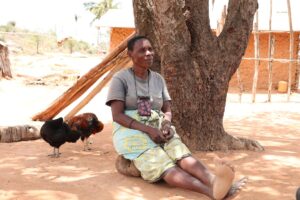
Bahati acknowledges that raising her grandkids at her age is tough, but she loves them very much and does her best to care for them.
“There and then, I knew Alex was a fighter,” Josephine says. “Despite all he had been through, I think God placed some ray of hope and light in him, and I believe that is what he held on to for all those months.”
Diagnosis and Hope
Following a blood transfusion, Alex was referred to Kenya Medical Research Institute (KeMRI), a government institution in Kilifi, for further diagnosis.
At KeMRI doctors discovered that Alex had sickle cell anemia.
Following his long-sought diagnosis, Alex was enrolled in a program for free medicine and registered for quarterly checkups, where he gets to freely refill his medicine from the institution.
Alex’s three older siblings, who had similar problems, were also diagnosed and registered into the same government program. Alex’s family also has a strong support system back home thanks to the people sitting with me under the tree.
Bahati is a traditional coconut wine tapper and makes a dollar a day to help feed her grandkids. So the Hope Center helps by delivering food baskets to the family.
Josephine has Alex’s appointments marked in her calendar and ensures he gets to them. She goes the extra mile, offering transportation money to the family whenever they can’t afford the $10 needed to travel for the medicine.
The Light of the Family
Bahati is shouldering a heavy burden, but she knows she’s not alone.
“I hoped to be resting like most old people my age, but I can’t because I have to care for my grandkids. Their mother was my strength, and when she died, a part of me went with her,” Bahati says as she fights tears.
“But now my hope is slowly being renewed because Alex is now full of life,” she adds. “He is the light of my family, all thanks to the Hope Center and Josephine for saving his life.”
Alex is finishing kindergarten and is learning to read and write.
“I now know how to color drawings in my book, and I hope to get a sponsor so that I can also color drawings and send to them like other kids do,” says Alex.
Whether he becomes a pilot, an artist, or something he has not yet imagined, a little boy who was once just clinging to life now has dreams for the future.
Help a child like Alex have hope for a better future. Sponsor a child today!
We are accountable to the children we serve AND to our donors.
Our accountability to our donors is one of our highest priorities. Our goal is to use the funds entrusted to us as wise stewards. To do this requires continued monitoring of our fund distribution. OneChild is also a member in good standing with the Evangelical Council for Financial Accountability (ECFA)
